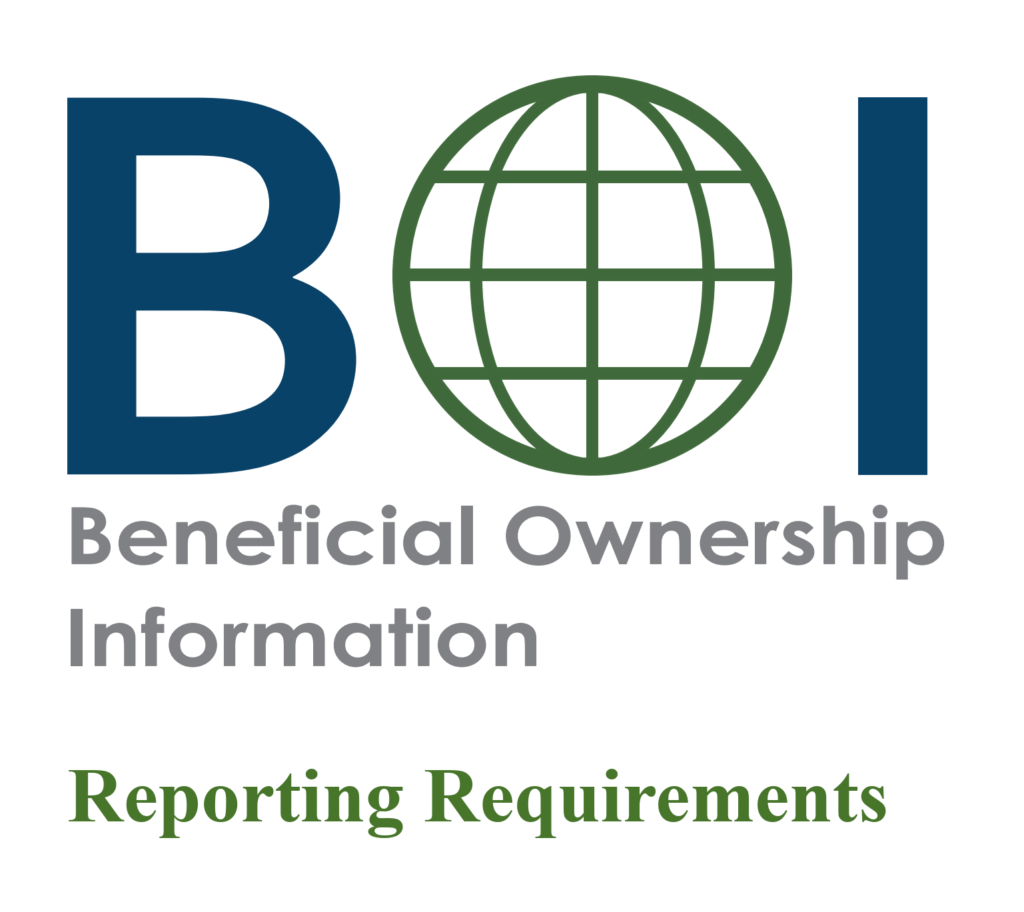Beginning on January 1, 2024, many companies will be required to report information to the government about who ultimately owns and controls them. The Federal Corporate Transparency Act (CTA), which was passed in early 2021, requires certain reporting entities to file beneficial ownership information (BOI) reports with the Financial Crimes Enforcement Network (FinCEN). The information collected will be kept in a private database maintained by FinCEN with access limited to authorized government authorities and in certain circumstances, financial institutions.
The Federal CTA was created with the goal of addressing concerns about money laundering, financial corruption, terrorism financing, and foreign espionage. The BOI reporting requirement will affect millions of businesses and should be considered carefully. This post provides a summary of key considerations, along with links to resources at the end. Our tax professionals are also available to provide further assistance.
Who Must Report
Companies required to report are called “reporting companies.” Domestic reporting companies include corporations, limited liability companies, limited liability partnerships, limited partnerships and any other entities created by the filing of a document with a secretary of state or any similar office in the United States. Foreign reporting companies are entities (including corporations and limited liability companies) formed under the law of a foreign country that have registered to do business in the United States by the filing of a document with a secretary of state or any similar office.
FinCEN FAQs Sec. C provides a flowchart to help companies determine whether they must report
Who Does Not Need to Report
There are 23 specific exemptions from the definition of a reporting company. These entities include publicly traded companies meeting specified requirements, many nonprofits, and certain large operating companies. These exempted companies include entities such as:
- Governmental authority
- Bank
- Investment company or investment adviser
- Venture capital fund adviser
- Insurance company
- Accounting firm
- Public utility
- Tax-exempt entity
- Large Operating Company (has specific requirements, see below)
The Large Operating Company exemption will apply to many companies. For an entity to qualify for this exemption, all of the following six items must apply:
- Employs more than 20 full-time employees
- More than 20 full-time employees are employed in the United States
- The entity has an operating presence at a physical office in the United States
- The entity filed a Federal income tax return for the previous year reporting more than $5,000,000 in gross receipts (net of returns)
- The greater than $5,000,000 amount was reported on Form 1120, 1120-S, 1065 or other applicable form
- The $5,000,000 threshold must be met with U.S. sales only
FinCEN’s Small Entity Compliance Guide includes checklists for the exemptions that may help determine whether a company qualifies (See Chapter 2.1) Additional information can be found in FinCEN FAQs Sec. C
Who Is a Beneficial Owner
A beneficial owner is any individual who owns or controls at least 25% of the ownership interests of a reporting company or who directly or indirectly exercises substantial control over a reporting company. Ownership interest can include any equity, stock or voting rights, capital or profit interest, convertible instruments, and options or privileges. An individual is considered to exercise substantial control if any of the following four general criteria are met:
- Senior Officer(s)
- Any person with authority to appoint or remove any senior officer or a majority of the board of directors
- Important decision-maker regarding company’s business, finances, structure
- Any other substantial control (catch-all)
There is no maximum number of beneficial owners who need to file, but exceptions to beneficial ownership include any minor child, nominee, intermediary, custodian, agent, or employee who is not a senior officer, inheritor (future), or creditor.
Additional information can be found in FinCEN FAQs Sec. D
Who Is a Company Applicant
Reporting companies created or registered on or after January 1, 2024, will need to report their company applicants. Only two individuals can qualify as company applicants:
- The individual who directly files the document that creates or registers the company; and
- If more than one person is involved in the filing, the individual who is primarily responsible for directing or controlling the filing.
An accountant or lawyer could be a company applicant, depending on their role in filing the document that creates or registers a reporting company.
FinCEN FAQs Sec. E provides a flowchart a to help identify company applicants; additional information is provided in Chapter 3.2 of FinCEN’s Small Entity Compliance Guide
What Should Be Reported
The information that needs to be reported depends on when the company was created or registered. If a reporting company was created or registered before January 1, 2024, the reporting company only needs to provide information about itself and its beneficial owners. If a reporting company is created or registered on or after January 1, 2024, the reporting company will need to report information about itself, its beneficial owners, and its company applicants. The information required is listed below.
| For Reporting Company | For Beneficial Owners & Company Applicants |
| Full legal name and DBA (as applicable) | Full legal name |
| Current U.S. address | Date of birth |
| Jurisdiction of formation | Current address (residential) |
| IRS TIN (EIN) | Identifying number, issuing jurisdiction, and image of one of the following:
|
Additional information can be found in FinCEN FAQs Sec. F
When to Report
The effective dates for the Federal CTA also depend on when the company was created or registered. For companies formed prior to January 1, 2024, the initial report is due January 1, 2025. For companies formed after January 1, 2024 and before January 1, 2025, the initial report is due 90 days after formation. Reporting companies created or registered on or after January 1, 2025, will have 30 calendar days to file their initial BOI reports with FinCEN. If there are any changes to information previously submitted in a report, an updated report must be filed within 30 days of change.
Additional information can be found in FinCEN FAQs Sec. B
How to Report
Reporting companies must report beneficial ownership information electronically. The reporting form and link to file are not yet available, but will be provided on FinCEN’s website after January 1, 2024. The system will provide the filer with confirmation of receipt once a completed report is filed with FinCEN. There are no filing fees, but substantial civil and criminal penalties may be imposed for failure to comply.
Non-filers may face civil penalties of up to $500 for each day that the violation continues, or criminal penalties including imprisonment for up to two years and/or a fine of up to $10,000. Senior officers of an entity that fails to file a required BOI report may be held accountable for that failure. Additionally, a person may be subject to civil and/or criminal penalties for willfully causing a company not to file a required BOI report or to report incomplete or false beneficial ownership information to FinCEN.
Additional information can be found in FinCEN FAQs Sec. K
Additional Resources
FinCEN has prepared a BOI Overview, a Frequently Asked Questions (FAQs) page and a Small Entity Compliance Guide to provide examples, checklists and additional information about the new requirements. These resources are explanatory only and do not supplement or modify any obligations imposed by statute or regulation. Refer to the Beneficial Ownership Information Reporting Rule, for details on specific provisions. FinCEN expects to publish additional guidance on their website in the future. For up-to-date news releases, please refer to FinCEN’s BOI Newsroom. Questions can be submitted on the FinCEN contact form.
Michael Weber and Rebekah Flanders reviewed these requirements in their Tax Updates presentation during our recent CPE day (view a recording here). For further information regarding the Federal CTA and BOI reporting requirements, please contact your GYF Tax Executive at 412-338-9300.
![]() Kathryn Bond assisted with the research and writing of this article.
Kathryn Bond assisted with the research and writing of this article.
She joined GYF’s Tax Group in 2023, following her graduation from Duquesne University’s MAcc program. Kathryn serves the firm’s corporate and individual clients, preparing tax returns and assisting
with other tax projects.






